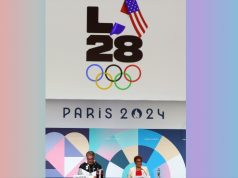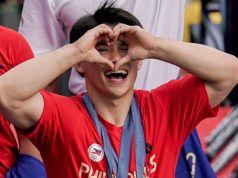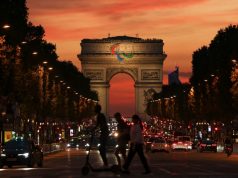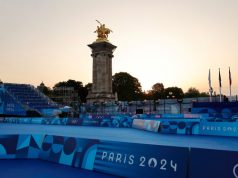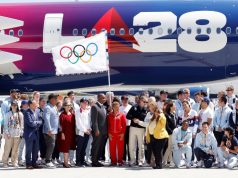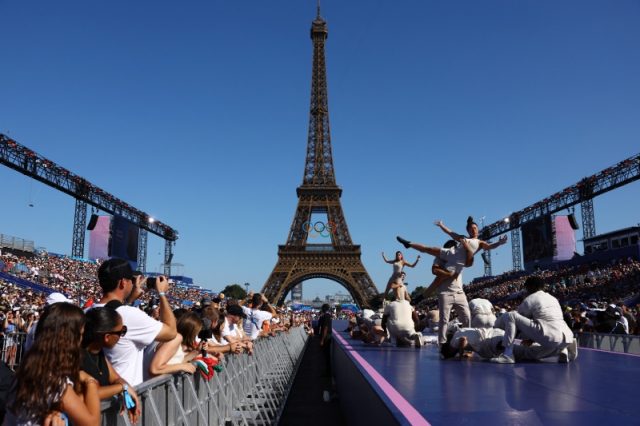
The Olympic Games would be nothing without the thousands of athletes who gather every four years to compete at the very highest level. But nor would it be such a grand spectacle without the companies and brands which stump up the sponsorship to fund it.
Such brands have been competing commercially for more than 100 years. At the first modern games in Athens in 1896, among the companies contributing to the cost was the British travel agency Thomas Cook and Son, which was appointed “official passenger agent”.
The package holiday pioneer negotiated discounts with railway and cruise ship companies for competitors and spectators. They also assisted customers from their base in a hotel in the Greek capital.
Over a century later, the Olympics branding system has evolved into three complex tiers of marketing and licensing programs. At the lowest layer are each competing country’s National Olympic Committees (NOCs) and National Paralympic Committees (NPCs). These include the British Olympic and Paralympic Associations, more commonly known as Team GB and Paralympics GB.
This level of sponsorship involves partner companies which support domestic sports development and Olympic teams. For Team GB this includes Aldi, NatWest and TikTok.
Next up is the host nation’s Organising Committees of the Olympic Games (OCOGs), which manage their own commercial program to support the staging of the Games. Paris 2024’s official partners include Accor Hotels, Air France and Le Coq Sportif.
And finally, at the top is the International Olympic Committee (IOC) itself. At this level, “The Olympic Partners” (TOPs) programme allows the IOC to agree exclusive, worldwide partnership agreements. These are in place for a set period of time across a range of 15 categories, including the longstanding “official timekeeper” (currently Omega), “payment services and transaction security” (Visa), and the newest addition, “non-alcoholic and alcoholic beers” (AB InBev).
It is estimated that these partnerships contribute around 30% of the IOC’s revenue (with most of the remainder coming from broadcasting rights). For the period from 2017 to 2021, this reached US$2.3 billion (£1.8 billion).
The immediate appeal for the partner brands is clear. For a price, they get to be associated with one of the world’s biggest events. However, one-third of the current roster of 15 TOPs corporations are apparently undecided about whether to continue after Paris 2024.
One of these, Toyota (“mobility partner”), is expected to end its nine-year, US$600 million deal soon. The company is said to be dissatisfied with how sponsorship money is handled, and reportedly believes it is not being used effectively to support athletes.
This rumored dissatisfaction raises questions about the relationships between corporations and major sporting events. Because those events are not always straightforward.
The 2016 Games in Brazil, for example, were marred by criticism about things such as “white elephant” infrastructure, accusations of displacement of communities and concerns over pollution and sanitation. There were also questions about the participation of Russian athletes despite recommendations that the country be banned after the state-sponsored doping scandal.
In 2024, even before the Paris games began, there was controversy over alleged animal cruelty, and the appearance of a convicted rapist in the beach volleyball competition.
It doesn’t necessarily make sense for major corporations to be involved in potentially controversial events. That said, they still present a massive global marketing opportunity.
Olympic values
Research suggests that a better approach might be for events and sponsors to consider a collaboration that involves trying to create a shared sense of value within the “ecosystem of an event”. This means working together to optimize commercial benefits while simultaneously contributing to positive social change.
In adopting this approach, sponsoring companies recognize their role as one of many parts of the event. With the Olympics, others would include athletes, fans and spectators, broadcasters and governing bodies.
The goal would be making the experience better for all of those elements, rather than being focusing on the corporate side. Events such as the Olympics provide a unique engagement platform for this to happen.
A (non-Olympic) example of this is Jaguar Land Rover’s alliance with the Invictus Games, an international sport event for wounded, injured and sick servicemen and women. The car company is involved with recruiting ex-service personnel while also working towards innovations in mobility.
Or there’s the supermarket chain Aldi’s deal with Team GB and Paralympics GB in which the chain has been educating consumers about the benefits of eating healthy, fresh produce as part of its “Get Set to Eat Fresh” campaign.
Even Coca-Cola, accused of being a massive plastic polluter, is using the Paris Games to help raise the profile of recyclable and reuseable solutions and encourage a cultural shift towards more sustainable packaging.
Of course, you could argue that these campaigns are really all about sales and PR. But positive messages around diet or the environment are still valuable.
They show that big corporations can have a positive effect with a collaborative and responsible approach. It doesn’t have to be all about a logo and brand exposure. Sponsorship can also be about building authentic associations – and meaningful engagement with society.![]()
David Cook, Senior Lecturer in Marketing, Nottingham Trent University and Steve Bingham, Senior Lecturer in Marketing, Nottingham Trent University. This article is republished from The Conversation under a Creative Commons license. Read the original article.




